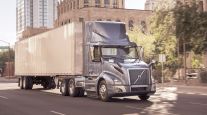Three Truck Makers Report Lower Earnings But Predict Higher North American Sales
This story appears in the July 29 print edition of Transport Topics.
Heavy-duty truck makers reported lower second-quarter profits and revenue, compared with a year ago, as the U.S. economy gradually improves.
Yet executives at Daimler AG, Paccar Inc. and Volvo AB agreed that the second half of this year could produce better North American sales.
Meanwhile, British purchases of trucks ahead of tighter environmental standards starting in January helped European sales in the quarter.
On a sequential basis, second-quarter business was better than the first quarter for the three companies.
“In the Nafta region, following a drop in market demand in the first half of the year, there should be at least some general market stabilization in the remaining months of 2013,” Stuttgart,
Germany-based Daimler said about its truck outlook in its July 24 report.
Operating income at the truck division fell 17%, year-over-year, to the U.S. equivalent of $566.9 million. Truck sales dipped 2% during the quarter to $10.4 billion.
North American unit sales of trucks increased by 1% to 34,924 vehicles. South and Central American sales shot up by 57%, but Western European sales declined by 5% and Asian volumes by 9%.
Profit as a percentage of revenue declined to 5.4% from 6.4% at the truck division. Trucks are Daimler’s second-largest division behind Mercedes-Benz cars.
Companywide, Daimler earned the equivalent of $5.99 billion, or $3.46 a share, in the quarter on revenue of $38.78 billion. That compares with $2.01 billion, or $1.78 a share, on revenue of $37.06 billion a year ago.
Paccar, based in Bellevue, Wash., attributed its quarterly results to the U.S. economy.
“Our customers are benefiting from record levels of freight tonnage and good freight rates,” Executive Vice President Dan Sobic said in the company’s July 23 report.
“The truck market should benefit from projected economic expansion in the remainder of the year, particularly growth in auto production and construction activity,” he said.
Analyst Stephen Volkmann told clients of Jefferies Group in his assessment of the North American market for truck makers in the longer term that “freight continues to rebound as industrial production and retail sales continue to recover from historical lows.”
Paccar, the parent company of Kenworth Truck Co. and Peterbilt Motors Co., earned $291.6 million, or 82 cents, on quarterly revenue of $4.01 billion. That compares with $297.2 million, or 83 cents, on revenue of $4.19 billion in the year-ago second quarter.
While profits and revenue from the company’s truck division declined, the parts and financial services divisions did better. Also, U.S. and Canadian revenue declined while European business improved.
At Gothenburg, Sweden-based Volvo Group, truck sales generate a majority of revenue and operating income. The division earned the equivalent of $279.7 million on quarterly revenue of $7.05 billion, the company said July 24.
In last year’s second quarter, truck making earned $616.3 million on revenue of $7.27 billion. Profit as a percentage of revenue declined to 4% from 8.5% at the truck division.
Volvo said its North American orders for new trucks improved by 39% over last year’s second quarter. Orders at sister company Mack Trucks jumped 80% to 4,260 vehicles, and Volvo Trucks in North America grew by 23% to 6,809 vehicles.
Volvo sales grew in South America but contracted in all other markets. North American sales declined by 7% in revenue and by 4% in vehicles sold. Companywide, Volvo AB posted the equivalent of $318 million, or 15 cents, on quarterly revenue of $11.09 billion. In last year’s second quarter it earned $715.3 million, or 35 cents, on revenue of $11.93 billion.
Daimler and Volvo are the world’s largest heavy-duty truck makers, respectively.
Forecasts remained strong even though expectations were trimmed by some. Volvo kept its North American industrywide forecast at 250,000 Class 8 vehicles, or 1,000 units more than in 2012, and said a second-half surge would make up for a first-half contraction.
But Paccar tightened its projection for this year’s U.S. and Canadian Class 8 industrywide sales to a range of 210,000 to 230,000 vehicles. Three months ago, the manufacturer said sales might go as high as 240,000 units. Heavy-duty sales in 2012 were 225,000 vehicles.
Paccar CEO Mark Pigott noted the European pre-buy in his remarks to stock analysts: “Customers, particularly in the [United Kingdom], are accelerating purchases of Euro 5 vehicles before the introduction of the Euro 6 emission standards in January 2014.” Paccar’s European brand is DAF Trucks, based in the Netherlands.
Analyst David Leiker of Robert W. Baird & Co. said truck makers are facing “weakened end markets in North America and Europe,” and said North American market share “could be at risk as Navistar re-enters the market with a full truck-engine lineup.”
Truck maker Navistar International Corp., based in Lisle, Ill., is scheduled to report results in early September for its quarter ending July 31.




